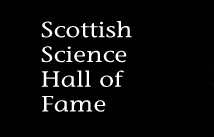James Clerk Maxwell (1831-1879)
James Clerk-Maxwell : [obituary]
332
Proceedings of the Royal Society
marriage, and lived a retired life, devoting himself to the care of
his estates and the education of his son.]
When I first made Clerk-Maxwell's acquaintance about thirty-five
years ago, at the Edinburgh Academy, he was a year before me,
being in the fifth class while I was in the fourth.
At school he was at first regarded as shy and rather dull; he made
no friendships, and he spent his occasional holidays in reading old
ballads, drawing curious diagrams, and making rude mechanical
models. His absorption in such pursuits, totally unintelligible to
his schoolfellows (who were then quite innocent of mathematics), of
course procured him a not very complimentary nickname, which I
know is still remembered by many Fellows of this Society. About
the middle of his school career, however, he surprised his com-
panions by suddenly becoming one of the most brilliant among
them, gaining high, and sometimes the highest, prizes for Scholar-
ship, Mathematics, and English verse composition. Erom this
time forward I became very intimate with him, and we discussed
together, with school-boy enthusiasm, numerous curious problems,
among which I remember particularly the various plane sections of
a ring or tore, and the form of a cylindrical mirror which should
show one his own image unperverted. I still possess some of the
MSS. which we exchanged in 1846 and early in 1847. Those by
Maxwell are on “The Conical Pendulum,” “Descartes' Ovals,”
“ Meloid and Apioid,” and “ Trifocal Curves.” All are drawn up in
strict geometrical form and divided into consecutive propositions.
The three latter are connected with his first published paper, com-
municated by Forbes to this Society and printed in our “ Proceed-
ings,” vol. ii., under the title “ On the Description of Oval Curves,
and those having a plurality of foci” (1846).
At the time when these papers were written he had received no
instruction in Mathematics beyond a few books of Euclid, and the
merest elements of Algebra.
The winter of 1847 found us together in the classes of Forbes and
Kelland, where he highly distinguished himself. With the former
he was a particular favourite, being admitted to the free use of the
class apparatus for original experiments. He lingered here behind
most of his former associates, having spent three years at the Univer-
sity of Edinburgh, working (without any assistance or supervision)

![James Clerk-Maxwell : [obituary] - Page 332](https://deriv.nls.uk/dcn4/7449/74491726.4.jpg)
